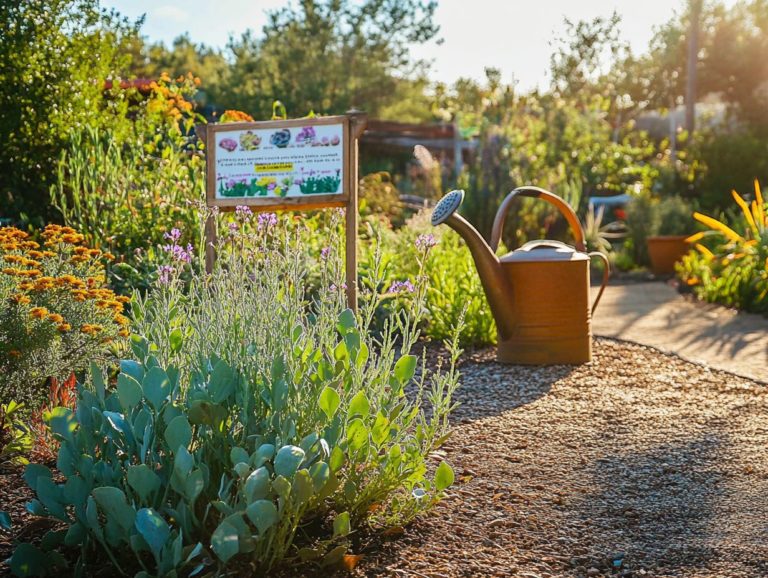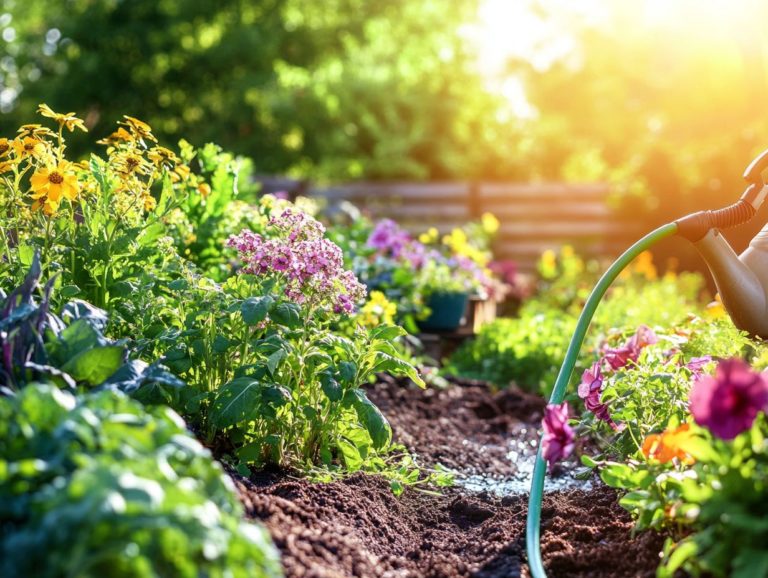The Importance of Seasonal Plant Care
Caring for plants is more than simply watering and pruning; it requires a deep understanding of seasonal shifts and their effects on plant health.
This guide delves into the art of seasonal plant care, uncovering its myriad benefits, from invigorated growth to environmental sustainability. You ll find essential tasks for each season laid out clearly, ensuring your plants flourish throughout the year.
We will also explore how to customize your care regimen to suit local climates and specific plant requirements. Get ready to take your gardening to the next level!
Contents
- Key Takeaways:
- Understanding Seasonal Plant Care
- Benefits of Seasonal Plant Care
- Essential Tasks for Each Season
- Adapting to Local Climate and Plant Needs
- Frequently Asked Questions
- What is the importance of seasonal plant care?
- Why is it necessary to adjust plant care routines according to the seasons?
- What are some general tips for seasonal plant care?
- How does seasonal plant care benefit plants?
- What are the consequences of neglecting seasonal plant care?
- Are there any resources available for learning about specific seasonal plant care?
Key Takeaways:

- Proper seasonal plant care leads to better health and growth for your plants.
- Adapt your care tasks to local climate and specific plant needs for the best results.
- Each season has its own important tasks, like pruning in spring and protecting plants in winter.
Understanding Seasonal Plant Care
Grasping the nuances of seasonal plant care is vital for you as a gardener in Central Indiana and beyond. It involves understanding the diverse needs of your plants throughout the year, ensuring they flourish during their flowering season and exhibit those captivating colors.
This comprehensive approach to gardening includes essential tasks such as soil preparation, managing watering requirements, and adding nutrients to the soil. The ultimate goal is to cultivate beautiful flower beds that not only boost curb appeal but also foster the overall health of your plants.
What is Seasonal Plant Care?
Seasonal plant care is all about customizing your approach to nurturing different types of plants whether they re annuals, perennials, or biennials based on their specific needs throughout the seasons.
This approach requires you to grasp how watering needs evolve with shifting temperatures, ensuring your plants receive the right amount of moisture to flourish. For example, during the sweltering summer months, many plants might demand more frequent watering, while in cooler seasons, their requirements may drop significantly.
Pest management is another critical aspect, as certain insects tend to appear at specific times of the year. Being proactive with preventative measures or treatments is essential to shield your plants. Moreover, environmental factors like sunlight exposure, humidity levels, and soil conditions profoundly impact both the health and growth of your plants. This underscores why a season-specific care strategy is vital it allows you to navigate these variations effectively and keep your greenery thriving all year round.
Benefits of Seasonal Plant Care
The advantages of seasonal plant care go well beyond mere improved beauty. You can expect to see enhanced plant health, significant environmental benefits, and cost savings that elevate your gardening experience.
By attending to the needs of your flower beds and landscapes throughout the seasons, you re not only cultivating beauty but also fostering a more sustainable and thriving garden.
Improved Plant Health and Growth
Improved plant health and growth stand out as one of the primary benefits of effective seasonal flower care. It highlights the crucial role of proper adding nutrients to the soil and proactive pest management in ensuring vibrant blooms and lush foliage.
By adopting a balanced approach to watering schedules and selecting high-quality fertilizers tailored to the unique needs of each plant, you can create an environment where flowering species not only survive but truly thrive. Seasonal care practices also demand vigilant monitoring for pests, employing organic management techniques that protect beneficial insects while keeping the harmful ones at bay.
This holistic strategy fosters stronger root systems and enhances nutrient absorption, culminating in an explosion of color and life throughout your garden. When combined, these methods turn ordinary plants into extraordinary showcases of nature’s beauty.
Environmental and Cost Benefits

Seasonal plant care cultivates healthier plants. It also offers environmental and financial benefits, such as saving water and using organic mulches properly.
By embracing these practices, you can create a diverse garden. A diverse garden supports helpful insects and pollinators. This diversity is essential for building resilient gardens that can better withstand pests and diseases.
Minimizing chemical usage safeguards local wildlife and helps keep waterways cleaner. You can also implement cost-saving strategies, such as composting kitchen scraps and using native plants that require less maintenance.
These choices lead to a more sustainable and budget-friendly gardening experience, allowing you to enjoy the fruits of your labor without breaking the bank.
Essential Tasks for Each Season
Essential tasks for each season are vital in nurturing a thriving garden. Each season demands particular activities like spring plant care, summer plant care, fall plant care, and winter plant care to guarantee optimal growth and vibrant colors in your flower beds.
Embracing these seasonal duties will transform your garden into a lush, flourishing sanctuary.
Plant Care for Spring
Spring plant care revolves around preparing your soil and addressing watering needs. This ensures your garden is primed for the growing season, including planting vibrant annuals, perennials, and ornamental grasses.
To achieve optimal growth, amend the soil with organic matter like compost. This enhances nutrient retention and improves soil structure.
Fertilization becomes crucial at this stage. Using a balanced fertilizer tailored to your specific plants promotes vigorous growth and stunning blooms.
Use effective pest management strategies, such as introducing beneficial insects or using natural repellents. These will help safeguard your new growth from potential threats.
Use tools like hand trowels for planting and soil testing kits to analyze nutrient levels. These will refine your gardening efforts and enhance the success of your flourishing garden.
Plant Care for Summer
Summer plant care is crucial for ensuring your garden bursts with vibrant colors and robust growth. Understanding and meeting the watering needs of your plants is essential.
As the summer sun blazes, your plants may crave daily hydration to truly thrive. Regularly inspect for signs of disease or pest issues. Early detection can be the difference between a flourishing garden and widespread damage.
Embracing beneficial insects like ladybugs and lacewings is a smart move in your natural pest control arsenal. They help keep harmful populations in check without resorting to chemicals.
By weaving these practices into your gardening routine, you can ensure your plants not only survive but truly flourish throughout the summer, showcasing their best qualities and remarkable resilience.
Plant Care for Fall
Fall plant care encompasses vital tasks such as mastering pruning techniques, implementing effective weed control, and preparing soil. These tasks are designed to keep your garden healthy and vibrant as the seasons change.
As you gear up for winter, focus on mulching. This simple yet effective step insulates your plants’ roots and retains moisture during the chillier months.
Act now by removing dead or overgrown branches! This lets your plants focus their energy on new growth, leading to a vibrant garden next spring.
Regular weeding is equally important, as it minimizes competition for nutrients and fosters a flourishing garden environment.
These fall practices not only safeguard your plants through winter but also lay a strong foundation for a thriving garden when spring arrives.
Winter Plant Care

Winter plant care is about preparing your soil and protecting your plants from harsh weather. Use organic mulches to help your plants stay healthy during their dormant season.
As it gets colder, check your watering needs. Many plants need less moisture when not actively growing.
Applying mulch strategically can make a big difference. It helps retain soil moisture and regulate temperature, creating a more stable environment for the roots.
Proper insulation around your delicate plants like using burlap or protective wraps can provide an additional shield against frost and freezing temperatures.
By using these thoughtful strategies, you can safeguard your plants against various winter challenges. Address their watering needs and set the stage for a vibrant resurgence come spring.
Adapting to Local Climate and Plant Needs
Understanding your local climate and your plants’ needs is key to successful seasonal plant care, especially in regions like Central Indiana. A keen awareness of seasonal shifts can profoundly influence your gardening success.
Factors to Consider for Optimal Care
To care for your seasonal flowers, focus on three main factors: seasonal changes, plant health, and proper gardening tools. These are vital for gardening success.
Assess the unique climate characteristics of your area. Temperature variations, humidity levels, and average rainfall will guide you in choosing species likely to thrive.
Evaluating soil quality is also important. Knowing whether your soil retains moisture or drains quickly will inform your watering practices. By analyzing these elements, you can develop effective strategies tailored to your plants’ specific needs, ensuring vibrant blooms throughout the season.
Frequently Asked Questions
What is the importance of seasonal plant care?
Seasonal plant care is your secret weapon for keeping your plants healthy and thriving all year long! It involves specific tasks and techniques essential for optimal growth and development during different seasons.
Why is it necessary to adjust plant care routines according to the seasons?

Plants have different needs in each season, such as temperature, sunlight, and water. Adjusting care routines according to these needs helps ensure that your plants can thrive in their environment.
What are some general tips for seasonal plant care?
Some general tips include regular watering, fertilizing, pruning, and pest control. Also, pay attention to temperature and light changes, adjusting your care as needed.
How does seasonal plant care benefit plants?
Seasonal plant care helps your plants stay healthy by providing necessary nutrients, protection, and maintenance. It promotes better growth and flowering while increasing their chances of survival.
What are the consequences of neglecting seasonal plant care?
Neglecting seasonal plant care can result in stunted growth, wilting, disease, or even death. It may also attract pests, leading to further damage. Regular care is essential for the overall well-being of your plants.
Are there any resources available for learning about specific seasonal plant care?
Yes, many resources like gardening books and websites provide detailed information on seasonal plant care for various plants. Consulting with local gardening experts or joining a gardening club can also provide personalized advice and tips.






